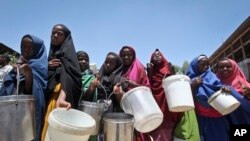The Associated Press first met Mohamed Kheir Issack, 80, and Issack Farow Hassan 75, crouching together in the dust.
Both blind, the two friends as close as brothers, were among hundreds of people who had arrived in the border town of Dollow in recent days, part of an unwilling migration that has seen more than 1 million hungry Somalis flee.
Somalia has long known droughts, but the climate shocks were now coming more frequently, leaving less room to recover and prepare for the next.
"We've experienced drought before but never the type of drought that will force you to move out of your village. We've never experienced such severe drought," Issack said.
Returning to their home after drought would be difficult for both men, in part because the area of Somalia they came from was controlled by an al-Qaida affiliate group called al-Shabab.
People who fled the area said that the group was heavily taxing residents by asking up to half of their harvest, even as people began to starve.
Al-Shabab reportedly made it almost impossible for humanitarian assistance to reach areas under their control. Their presence has played an especially deadly role during droughts.
An estimated quarter-million people died in the famine declared in Somalia in 2011, many because al-Shabab wouldn't allow most aid in or, often, suffering people out.
This time, those arriving told the AP that the extremists were allowing some of the mothers, children and elderly who have lost everything to flee.
Pastoralists and farmers who had known for generations where to take cattle, goats and camels when the usual water sources run dry have been horrified by this drought that has seen four straight rainy seasons fail.
When rain does fall, more unpredictably now, hotter temperatures mean it evaporates faster, leaving meager amounts for farming or drinking.
East Africa is the world's hardest-hit drought region, according to the U.N.'s desertification agency.
Experts say forecasts indicate that the fifth rainy season now underway would fail, too, and even the sixth one set for early next year.
With that, Somalia will be in uncharted lands beyond the memories of even Issack, Hassan and their age-mates.







